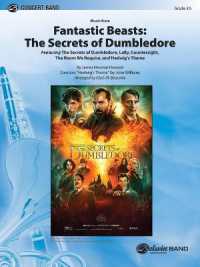Full Description
Designed to foster "inquiry-mindedness," this book prepares graduate students to develop a conceptual framework and conduct inquiry projects that are linked to ongoing conversations in a field. The authors examine different ways of knowing and show how to identify a research question; build arguments and support them with evidence; make informed design decisions; engage in reflective, ethical practices; and produce a written proposal or report. Each chapter opens with a set of critical questions, followed by a dialogue among five fictional graduate students exploring questions and concerns about their own inquiry projects; these issues are revisited throughout the chapter. Other useful features include end-of-chapter learning activities for individual or group use.
Useful pedagogical features include: *Framing questions for exploration and reflection. *Chapter-opening dialogues that bring in perspectives from multiple disciplines. *Example boxes with detailed cases and questions for the reader. *End-of-chapter activities and experiential exercises that guide readers to develop their own inquiry projects. *Suggestions for further reading.
Contents
1. Inquiry as Learning: Beginning the Journey Introduction What Is Inquiry? The Learner as Knowledge Generator Drawing on Values and Passion Your Journey into Systematic Inquiry For Further Reading 2. Ways of Knowing: Finding a Compass Ways of Knowing Fundamental Assumptions Mapping Perspectives Back to Ontology and Epistemology For Further Reading 3. The Cycle of Inquiry: More Than One Way to Get There Inquiry in Action/Inquiry as Practice The Systematic Inquiry Cycle Validity, Credibility, and Trustworthiness For Further Reading 4. Being an Ethical Inquirer: Staying Alert on the Road Ethics in Inquiry The Inquirer as a Moral Practitioner Standards for Practice and Procedural Matters Ethics, Trustworthiness, and Rigor Ethical Theories Ethics and Reflexivity For Further Reading 5. Constructing Conceptual Frameworks: Building the Route What Is a Conceptual Framework? Building an Argument Entering the Conversation: Your Community of Practice Entering the Conversation: Your Engagement Entering the Conversation: The Communities of Discourse Ways of Organizing Chapter Summary For Further Reading 6. Designing the Inquiry Project: Finding "True North" Moving from the Conceptual Framework into Design Considering Various Designs Samira's Research Questions and Possible Designs A Short Course on Research Methods Planning for Analysis and Interpretation The Research Proposal: Bringing it All Together An Example of Connecting the What and the How Chapter Summary For Further Reading 7. Things to Consider in Writing: Staying in the Right Lane Writing Introductions The Nasty Problem of Plagiarism Using Proper Citation Format For Further Reading 8. Knowledge Use: Arriving at Your Destination Using What You have Learned Who Cares?: Potential Audiences Communicating for Use Passions and Closing the Loop For Further Reading







